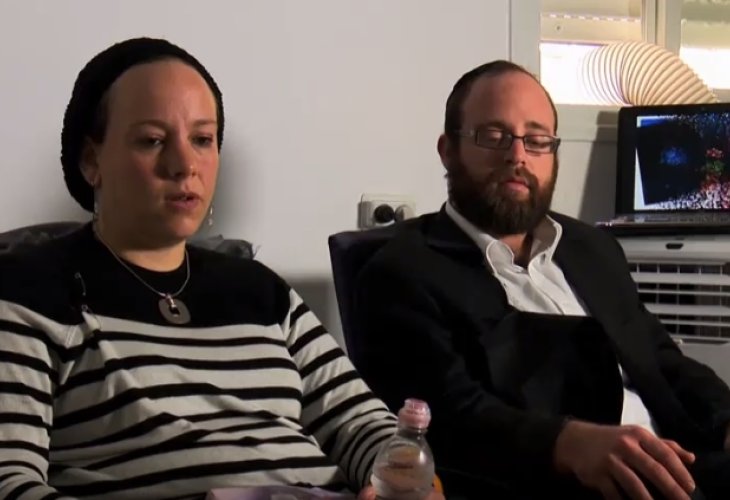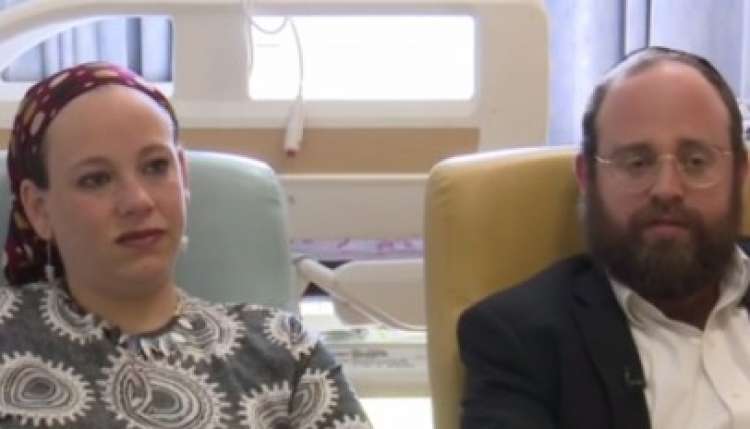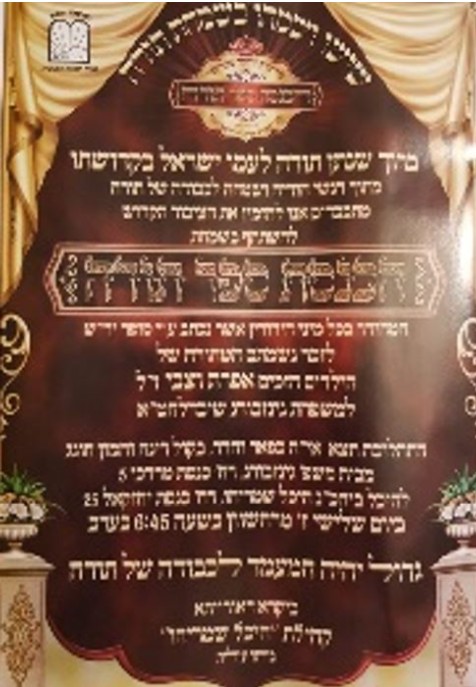"There Is No Compensation for the Loss of Children, Only Comfort": An Emotional Interview with the Ginzburg Family
The fears, the moment of the news, the loss, potential compensation, comfort, and the desire to bring them under the chuppah. Rabbi Reuven and Debora Ginzburg in an emotional interview.

The dedication of a Torah scroll is undoubtedly a great mitzvah and privilege, but for some, it holds additional significance. "We wanted to make a chuppah," says Rabbi Reuven Ginzburg with a somber tone. "My wife told me: 'I was supposed to marry off our children, Efrat and Zvi, of blessed memory, and I needed to spend a lot on their weddings. Now I know I won't marry them off, but I won't give up on those wedding expenses. I'll spend it on dedicating a Torah scroll.'"
About a year ago, it was a particularly tragic evening for the residents of Beitar, for the people of Israel, and an unimaginable tragedy for the Ginzburg family, who were informed overnight about a fire that consumed their home while their two young children, Efrat (four years old) and Zvi (two years old), were trapped inside. "They called me and told me: 'There's a fire in your building, come quickly. I asked: 'What about the children? I have five children at home.' They told me: 'Three are okay.' 'And what about the other two?' I asked, trembling. 'They're also okay,' they said. According to Ginzburg, at this moment, he started to realize that something was wrong. "I called another neighbor and asked him: 'What's going on with my five children?' He told me: 'They're all okay.' I wasn't reassured and continued to ask: 'Are they all by your side, do you see them?' 'No, only three are next to me,' he answered. That was enough for me."
Darkness Upon the Deep
What do you do at such moments?
"I cannot recall those minutes. I wouldn't wish anyone in the universe to experience even a fraction of such a feeling. The heart wants to break, the soul is shattered. My wife got into the ambulance where our three eldest daughters who survived were. She asked the rescue teams, what about Efrat and Zvi? They told her: 'We couldn't save Efrat.' She dared not ask about Zvi. She turned to the three daughters, who did not fully understand the news that struck them at that moment, and told them: "Say after me three times: 'Everything Hashem does is for the best.' That's how they said it word for word, my wife with my three daughters - aged 11, 9, and 7, as the smell of my two children's fire hovered in the air."
The house is completely burnt with two children inside, where do you go from there?
"I didn't dare approach the scene during the chaos. When I arrived, my wife and three daughters were already waiting at a relative's house who lived nearby. We gathered within ourselves, trying to understand how it was possible that we were in the heart of such a tragedy. Us? No matter how many times we heard it from all the professionals, the heart couldn't digest it and believe that it was truly related to us, that these were our children. Only during the funeral did I begin to digest it somewhat, after suddenly seeing before my eyes that it was indeed true. Instead of my children saying 'Father, Father,' I said about them 'My son, My son.' This is not the way of the world, where a father buries his child, let alone two of them, but we do not question Hashem's ways, He knows exactly what He is doing."
Who was by your side during those difficult hours and days afterward?
"Who wasn't? All of Israel showed its glory, without difference in sector or religion, everyone was by our side. Beyond the heavy disaster of losing the children, we were also left without a home, nothing - nada - zero. What remained were the pajamas the children were wearing, and a photo album that was in the living room. Beyond that, we were at a loss. But who is like your people, Israel, all people of kindness mobilized for us and found an apartment that was finishing renovation. The final touches were missing there. Workers were brought from Bethlehem, and within a day they finished renovating the entire apartment. The next day we moved in. But that wasn't where it ended. A stream of electrical appliances, furniture, clothing, groceries, and more began. Everything we needed to start living, to lift our heads out of the water. It warmed our hearts very much during such a critical time. This is Israel at its best. Furthermore, the tragedy occurred during the mayoral election campaign, which naturally involves a risk of baseless hatred and slander, but that week, all parties decided to close their election headquarters, and the city of Beitar was quiet. Love for no reason, or not for free, walked the streets. People became sensitive to one another, there was a great sanctification of Hashem."
"The feelings are hard, difficult, and terrible," said mother Debora Ginzburg at the end of the shiva in an interview with 'Yom L'Yom'. "It's really a feeling of complete destruction. But we, with Hashem's help, have the strength and fuel to continue on, we received reinforcement, a strong and loving embrace from the people of Israel, and we got up in the morning with light in our eyes. We went out to shops, we went through the first baptism of fire, an hour after we got up we were outside." Today, a year after the tragedy, when I ask the mother what she has to say to the people of Israel, she tells me: "Even today, a year later, nothing can be said. The disaster is dreadful, if one doesn't feel it, they'll never understand, and no one should feel it. Whatever I'll say will be dwarfed in relation to the truth, the feeling, the great void that remains. There are no words to describe the absence, what was and is no more."
There Is No Compensation
Six months after the severe tragedy, the Ginzburg family was blessed with the birth of triplets, two daughters, and a son. Light dawned in their home, and their hearts were filled with smiles that were almost forgotten.
Do you feel that Hashem has compensated you? I ask Debora Ginzburg.
"Absolutely not. There is no compensation for such a loss, nor can there be compensation. Each soul is a different world, a different person. But we did receive comfort, from the Master of comfort, from Hashem. He could have chosen not to comfort us, but He decided to. Even within the smoke, the soot, the chaos, Hashem did not forget us. There are things we have no explanation for, like one of the daughters who slept in the bed between Efrat and Zvi, came out unscathed. She was mere seconds apart from them. Does anyone have an explanation for why she survived and they did not? No, there is no explanation, except simply that Hashem wanted to take two from us and not three, so this is what we see, and we thank Him."
Rabbi Ginzburg recounts that his wife says the triplets belong to the compensation department, but he also repeats her words: "There can be no compensation, only comfort." Additionally, he offers an intriguing explanation: "It's written in the Talmud, Tractate Pesachim, page 118b: 'At the time when the Egyptians drowned at the splitting of the Red Sea, Hashem said to the angel of the sea: 'Spit them out onto the dry land.' The angel said: 'Master of the Universe, is there a slave who receives a gift from his master and then returns it?' Hashem replied: 'I will give you one and a half of them.' The angel said: 'Master of the Universe, is there a slave who demands a thing from his master?' Hashem said: 'The Kishon River will be my guarantor.' Immediately the angel spat them out onto the dry land, and the Israelites saw them, as it is said (Exodus 14:30): 'And Israel saw Egypt dead on the shore of the sea.' What is one and a half of them? Because concerning Pharaoh it is written (Exodus 14:7): 'six hundred chosen chariots,' and about Sisera, it is written (Judges 4:3/13): 'nine hundred iron chariots.' Thus, we see that for every one that Hashem takes, He returns one and a half, that is, in exchange for six hundred Egyptians taken by the sea, He returned it one and a half times, which is nine hundred. The same for us, He returned it one and a half times, took two and returned three."

Did you do anything for the elevation of the souls of Zvi and Efrat?
"Naturally, the place we were drawn to all the time was to do something for the elevation of their souls, but they told us in the name of the Gaon Rabbi Chaim Kanievsky that nothing needs to be done for their soul's elevation, because it hurts Hashem more about the loss, and He cares for them more than we think, therefore he said we do not need to elevate their souls, because they are already high-above, beyond our understanding."
A few weeks ago, the Ginzburg family dedicated a Torah scroll in memory of the children who perished. Everyone who participated in this sacred and uplifting event could testify that they felt as if they were in the midst of the Ne'ilah prayer. The tears flowed there like water, the hearts united, the heavens rejoiced and wept, and the angels stood still. "We felt that we brought our children to the chuppah," Rabbi Ginzburg whispers. But if I thought I had reached the peak of emotion, he continues to tell me: "You won't remain indifferent when you hear how the Torah scroll dedication came about for our small children."

His voice trembles as he tells the story: "During the shiva, my father received a call from Rabbi Aharon Bina, the director of the Ranener Fund, announcing that they decided to donate a Torah scroll in memory of my children. The Ranener Fund donates Torah scrolls in memory of victims of terror attacks, and not from other tragedies. My father asked him why we are different from other tragedies that don't receive a Torah scroll from them, and he told him it was an opportunity for him to close a decades-old circle, when my grandfather, Rabbi Reuven Ginzburg, did him a favor in yeshiva. He owed him a huge gratitude for that, and now he is closing the circle. Do you understand how the world is so small?"
Finally, Rabbi Ginzburg says, "Let's not forget that all the world we live in now was created by a bereaved father. After all, Cain killed Abel, Adam became a bereaved father. Then Seth was born, and from him, after several generations, Noah was born. And from there the whole humanity developed. So we must know that even a bereaved father must continue for the sake of future generations, for the sake of the world and everything in it."

